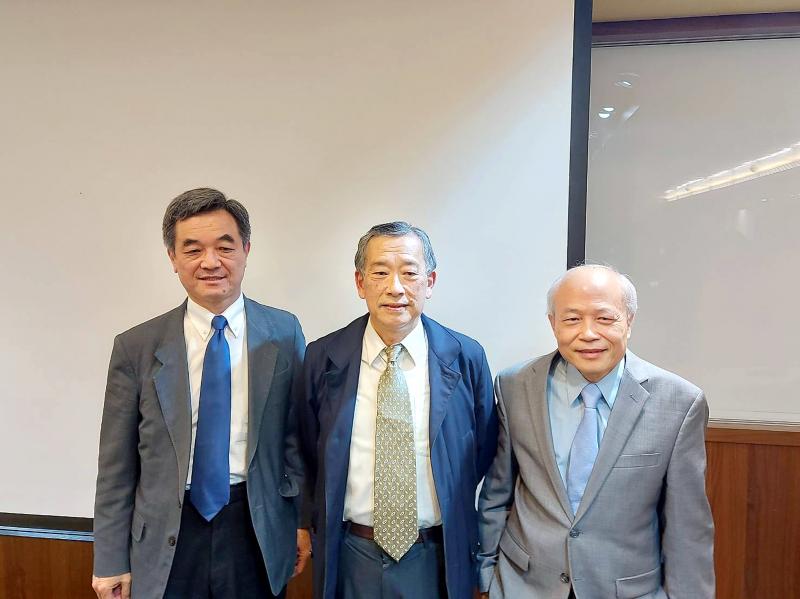OBI Pharma Inc (浩鼎生技) on Tuesday announced that its COVID-19 vaccine BCVax would enter phase 1 and 2 clinical trials in the second half of this year.
The results of animal experiments have shown that BCVax can produce high levels of antibody titers and has neutralizing effects against different variants of SARS-CoV-2, the company said.
While the company focuses primarily on cancer drugs, it has also been closely following currently available COVID-19 vaccines, OBI Pharma chairman Michael Chang (張念慈) said.

Photo: Chen Yung-chi, Taipei Times
Although the COVID-19 vaccine market seems to have turned into a “red ocean,” meaning cutthroat competition, OBI Pharma in July last year still proceeded with the research and development of a COVID-19 vaccine, Chang said.
The company has filed a provisional patent application with the US Patent and Trademark Office for its vaccine, and expects to submit applications for clinical trials with Taiwan’s Center for Drug Evaluation in July or August, he said.
A phase 1 clinical trial would take place in Taiwan in the second half of this year, while phase 2 trials would be conducted abroad, Chang said.
OBI Pharma would also seek partnerships to carry out phase 3 trials abroad involving more than 20,000 volunteers, Chang added.
The company said it initially planned to unveil its vaccine last month, but had to conduct animal tests focused on the Omicron variant of SARS-CoV-2 after the variant spread around the world late last year
BCVax is a recombinant protein-based vaccine, OBI lead scientific officer Lai Ming-tain (賴明添) said, adding that OBI Pharma wanted to create a vaccine with minimal side effects and effective adjuvants that can induce stronger T-cell responses.
Yang Ming-chen (楊明臻), who is a project manager at the company, said the vaccine works against different COVID-19 variants, including Omicron, thanks to immune stimulating complexes, which contain several copies of an antigen.

Merida Industry Co (美利達) has seen signs of recovery in the US and European markets this year, as customers are gradually depleting their inventories, the bicycle maker told shareholders yesterday. Given robust growth in new orders at its Taiwanese factory, coupled with its subsidiaries’ improving performance, Merida said it remains confident about the bicycle market’s prospects and expects steady growth in its core business this year. CAUTION ON CHINA However, the company must handle the Chinese market with great caution, as sales of road bikes there have declined significantly, affecting its revenue and profitability, Merida said in a statement, adding that it would

i Gasoline and diesel prices at fuel stations are this week to rise NT$0.1 per liter, as tensions in the Middle East pushed crude oil prices higher last week, CPC Corp, Taiwan (台灣中油) and Formosa Petrochemical Corp (台塑石化) said yesterday. International crude oil prices last week rose for the third consecutive week due to an escalating conflict between Israel and Iran, as the market is concerned that the situation in the Middle East might affect crude oil supply, CPC and Formosa said in separate statements. Front-month Brent crude oil futures — the international oil benchmark — rose 3.75 percent to settle at US$77.01

RISING: Strong exports, and life insurance companies’ efforts to manage currency risks indicates the NT dollar would eventually pass the 29 level, an expert said The New Taiwan dollar yesterday rallied to its strongest in three years amid inflows to the nation’s stock market and broad-based weakness in the US dollar. Exporter sales of the US currency and a repatriation of funds from local asset managers also played a role, said two traders, who asked not to be identified as they were not authorized to speak publicly. State-owned banks were seen buying the greenback yesterday, but only at a moderate scale, the traders said. The local currency gained 0.77 percent, outperforming almost all of its Asian peers, to close at NT$29.165 per US dollar in Taipei trading yesterday. The

RECORD LOW: Global firms’ increased inventories, tariff disputes not yet impacting Taiwan and new graduates not yet entering the market contributed to the decrease Taiwan’s unemployment rate last month dropped to 3.3 percent, the lowest for the month in 25 years, as strong exports and resilient domestic demand boosted hiring across various sectors, the Directorate-General of Budget, Accounting and Statistics (DGBAS) said yesterday. After seasonal adjustments, the jobless rate eased to 3.34 percent, the best performance in 24 years, suggesting a stable labor market, although a mild increase is expected with the graduation season from this month through August, the statistics agency said. “Potential shocks from tariff disputes between the US and China have yet to affect Taiwan’s job market,” Census Department Deputy Director Tan Wen-ling